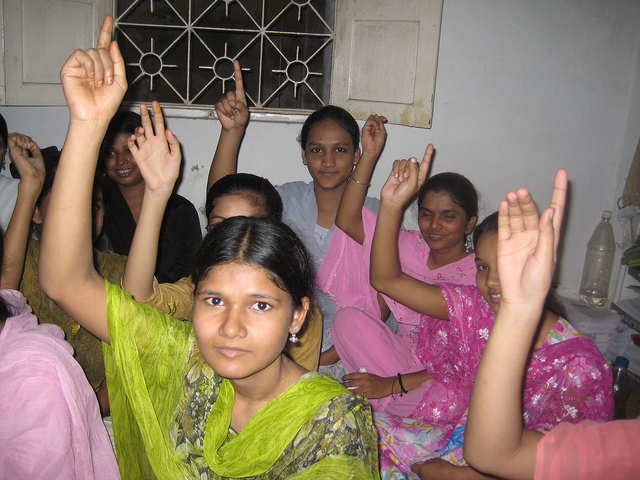Jointly sponsored by UNDP and OECD, the High-Level Meeting intended to demonstrate progress towards truly global partnerships between governments, business and civil society in making development co-operation more effective and sustainable. But opening remarks by leaders of the two sponsoring agencies and the plenary panel discussion seemed largely focused on ‘aid effectiveness’. Concepts of risk management, improving public finance management and procurement systems of recipient countries, predictability of aid flows and monitoring results to report to donor countries’ parliaments were the main discussion points. Progress on these aspects seemed to be the dominant concern of sponsors and panellists.
In break-out groups, aid continued to be the focus around which issues of ownership, transparency and partnerships were being constructed and realised.
As a delegate from India –now a large middle-income country (MIC) with high levels of poverty, despite its rapid economic growth during the past decade– these conversations seemed to me somewhat irrelevant and dated. Instead, critical issues of malnutrition, violence against women, social inclusion and sustainable livelihoods need to be tackled in India through improved democratic governance, transparency and accountability. Domestic resources are adequate for addressing these issues in my country, but they are not deployed in an efficient and productive manner.
This significant gathering in Mexico of over 1,500 delegates from around the world raised important questions for the future of development co-operation. Is a new global partnership being constructed around the old issues of ODA? Are lingering concerns of aid effectiveness from Paris and Accra still unresolved 30 months after Busan? Will a new age of development co-operation be able to break free from previous ODA (Official Development Aid) frameworks? Will new actors in the development arena — large emerging economies such as the BRICS (Brazil, Russia, India, China and South Africa) and other middle income countries– find resonance of their principles and aspirations in future debates? How will local level ground-up partnerships define contextually appropriate development effectiveness, without reference to global actors?
Various focus sessions and plenary presentations during the two-day conference demonstrated several shifting trends. First, emphasis on effective development co-operation was reiterated as an important shift away from Busan. But it was not clear how the effective co-operation framework and indicators would differ from the old ‘aid effectiveness’ paradigm in practice.
Second, inclusive multi-stakeholder partnerships involving governments, civil society, business and thinktanks were agreed to be crucial to achieveing effective development co-operation. What remains ambiguous is how unequal power relations between stakeholders can be handled for meaningful co-operation.
Third, speakers acknowledged the distinctive and unique nature of South-South co-operation, while also aspiring for triangular North-South-South co-operation approaches.
Finally, there was welcome attention to the strengths and development challenges of the MICs. As the president of Mexico reminded the audience, countries like his are both recipients and providers of development assistance and hence able to better empathise with other developing countries.
Non-state actors are becoming more relevant in promoting development effectiveness and civil society organisations from many larger MICs have long worked in solidarity with their counterparts in other developing countries. Now, businesses and thinktanks are also becoming important non-state actors in promoting South-South development co-operation.
The Rising Powers in International Development Programme, hosted by the UK Institute of Development Studies (IDS), is working to build an evidence base around the role of rising powers in international development, producing new thinking and practical guidance on engagement and mutual learning.
The programme’s global delegation attended the Mexico meeting to share lessons from non-state actors’ contributions in the emerging Global Partnership for Effective Development Cooperation and we will continue to strengthen civil society contributions through the new Future International Co-operation Policy Network.
Beyond demanding transparency and accountability around the aid that their own countries still receive, we’ve found that civil society organisations from MICs can add significant value to other countries’ development cooperation. From the four case studies we presented at the High-Level Meeting, we derived four important lessons for taking forward principles and mechanisms of civil society-led South-South Development Cooperation (SSDC).
Firstly, solidarity and trust between cooperation partners can lead to more focused civil society-led South-South cooperation and mobilise broader coalitions for common causes.
Secondly, because civil society-led South South cooperation aspires to be more flexible and adaptable than traditional North-South donor realtionships, it avoids intrusive conditions and creates space for innovation.
Thirdly, a multi-stakeholder approach is essential to ensuring sustainability.
Finally, new methods of measuring SSDC need to be explored to capture the complex effects of civil society-led transnational initiatives.
Alongside governments and businesses, CSOs have been developing innovative practices to contribute to the global struggle against poverty. They have considerable experience and great potential of sharing these practices internationally as well as at home, and their important contributions should not get lost in the state-to-state negotiations that can often become the focus of global initiatives such as the Global Partnership.
—-
Rajesh Tandon is the Founder and President of Indian civil society organisation Participatory Research in Asia (PRIA) and a member of the Future International Cooperation Policy Network.
]]>

Villagers returning home as the sun sets in the Philippines. Credit: UN Photo
Any contemporary story on development in Asia-Pacific begins with reflection on massive gains achieved in the fight against poverty. The incidence of people living at less than 1.25 dollars a day fell from 54.5 percent in 1990 to 20.7 percent in 2010, with the number of extreme poor declining from 1.48 billion to 733 million. This precipitous decline in poverty has been accompanied by tremendous gains in access to health and education.
Without diminishing the progress made over the last 25 years, the region remains somewhat of a paradox: enviable growth and wealth on one hand and dire poverty and inequality on the other. Asia-Pacific remains home to more than 60 percent of the world’s extreme poor and two-thirds of the world’s hungry. While we’ve seen progress on the Millennium Development Goals (MDGs), it is uneven across and within countries. Despite eye-popping gross domestic product growth, increasing income inequality and vulnerability, infrastructure constraints, climate change and disaster risks threaten to undermine achievements.
As these threats increase, the region’s sources of finance and aid architecture are also rapidly changing. High rates of growth and challenging budget environments in many member-countries of the Organisation for Economic Co-operation and Development (OECD) have resulted in a decline of concessional development finance across Asia. This is against a backdrop of non-aid resources – such as remittances and foreign direct investment – increasing in importance and a growth in funding from “non-traditional” donors, including emerging economies and philanthropic organisations. On top of this, more countries have greater access to international capital markets to fund their development needs.
International efforts to make aid more effective — with conferences held from Rome (2003) to Paris (2005) and Accra (2008) — focused on good principles for aid providers and recipients, largely in the context of attaining the MDGs at the country level. It was less clear how these narrow principles would remain relevant in a rapidly changing global environment, particularly here in Asia-Pacific.
The Global Partnership for Effective Development Co-operation, launched at the fourth High Level Forum on Aid Effectiveness in Busan, recognised this and highlighted partnerships based on shared principles for better development results, nudging forward the agenda on MDG 8 (Develop a Global Partnership for Development). This was advanced further by the United Nations High Level Panel on the Post-2015 Development Agenda which called for a new global partnership framework – a transformative shift for co-operation and mutual accountability. In Bali, March 2013, the Panel agreed on the central importance of a global partnership for a “people-centred and planet-sensitive agenda”, based on “common humanity”.
These developments demonstrate an emerging view that any post-2015 framework needs to be supported by dynamic partnerships. If stakeholders ultimately agree, then the successor to Goal 8 will be central to all other post-2015 goals and applicable to all countries – unlike the MDG framework where goals 1-7 applied to developing countries and goal 8 primarily targeted developed countries.
Asia-Pacific has undertaken serious effort to examine emerging development challenges and goals from a regional perspective, even as the globally agreed post-2015 agenda is being finalised. The eighth Asia-Pacific Regional MDG Report 2012/2013 calls for integrating the three pillars of sustainable development – economic prosperity, social equity, and environmental responsibility into a post-2015 development framework.
By 2015, the ninth report will consolidate ideas from the region on development partnerships and offer insights to strengthen the successor to Goal 8. Three strategic areas for regional and global partnerships have been identified, which help articulate the region’s priorities for a successor to MDG 8. These include:
- regional public goods - e.g. promoting technology and knowledge transfer in the areas of food security, environment and health, which will not only help address development deficits in individual countries, but also have cross-border implications;
- data - strengthening the evidence base for planning and monitoring, including more disaggregation to measure and address inequalities and tracking energy-intensity of GDP rather than just (already low) per capita emissions; and
- finance ̶ expanding financing options for the Post-2015 agenda from both public and private sources.
Countries must each find ways to link the post-2015 and Global Partnership agendas – bringing together distinct goals to reflect nations’ different but complementary responsibilities for a shared global agenda. Collectively, we need to co-ordinate these interlinked agendas – including MDG 8 discussions and the Global Partnership – as well as identify ways to measure results from these partnerships and indicators attached to the successor to MDG 8.
Responding to the region’s aspirations, the Asian Development Bank stands ready to support this process any way we can.
Stephen P. Groff is the Asian Development Bank’s Vice-President for East Asia, Southeast Asia and the Pacific.
]]>